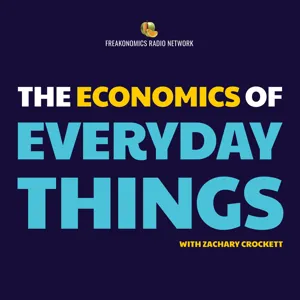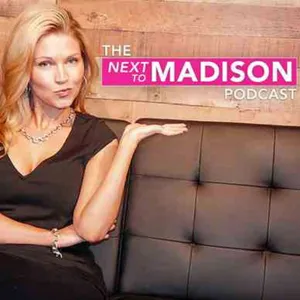Podcast Summary
The Power of Chance Encounters: One unexpected moment can lead to long-lasting consequences and change the course of our lives. Music has the power to connect people and endure across generations.
Sometimes, one moment in life can lead to unexpected and long-lasting consequences. The woman in this story, whose name became famous through the hit song "My Sharona," was just a teenager working at a clothing store when she met the musician who would go on to write a song about her. She initially rejected his advances, but he persisted and eventually wrote the hit single that catapulted him to fame. The woman, who was initially unimpressed, was suddenly thrust into the limelight and became a household name. This story illustrates the power of chance encounters and the ripple effect that one moment can have on the rest of our lives. It also highlights the enduring impact of music and how it can connect people across generations.
A productive hour of songwriting led to The Neck's hit single 'Sharona': Creativity, hard work, and the right moment of inspiration can lead to a game-changing breakthrough for an artist or band.
A pivotal moment in the life of Burton Aver, the lead guitarist and co-writer of The Neck, came during a productive hour of songwriting when he and his bandmate Doug penned their hit single "Sharona." At the time, The Neck was a struggling band playing local clubs in West Hollywood, living off a few hundred dollars per gig. But their high-energy performances had earned them a cult following and the attention of industry heavyweights. During this fruitful writing session, Burton drew inspiration from Elvis Costello's raw, exciting sound, and together they crafted a song that would become the perfect encore closer. The result was a game-changer for the band. That hour of songwriting led to a surge in popularity, with notable musicians like Stephen Stills, Eddie Money, Tom Petty, and Bruce Springsteen joining them on stage. The following morning, record companies were clamoring for a deal with The Neck, and their fortunes were forever changed. This is a testament to the power of creativity, hard work, and the right moment of inspiration.
The Knack's Thrifty Recording Approach: The Knack kept most of their earnings from their successful debut album by recording on a budget, but had to give up ownership of the masters to the record company
The band The Knack's thrifty recording approach allowed them to keep more of their earnings from their successful debut album "Get the Knack," despite the record company owning the masters. They signed with Capital Records for a $100,000 advance, but their low recording costs left them with over $82,000 after recording. However, this came with the trade-off that the record company owned the masters and received the majority of the sales revenue, giving the band only 13% of the physical copy sales. This unheard-of deal paid off when the album sold 2 million copies in the first year alone. Initially, the band's earnings went towards paying back the advance, but once debt was settled, they started receiving checks. This experience highlights the importance of financial management in the music industry, even with unfavorable deals.
Songwriting royalties: Performance and mechanical revenues: Songwriting royalties come from public performance and sale of a song as a composition, providing separate revenue streams from record sales. Examples include 'My Sharona' writers' earnings from radio play, record sales, parodies, and samples.
Being a songwriter in a band can lead to significant financial success through performance and mechanical royalties. These royalties come from the public performance or sale of a song as a composition, and they can provide revenue streams that are separate from record sales. For example, Doug Figer and Marty Avera, the writers of "My Sharona," earned performance royalties when their song was played on the radio and mechanical royalties when it was sold as a record. Additionally, they received royalties when Weird Al Yankovic created a parody of their song and when Run DMC sampled it. This demonstrates the importance of songwriting in the music industry and the potential financial benefits that come with it.
The financial benefits of samples in music: Using samples in music can lead to significant financial gains, even decades after the initial release, through synchronization royalties and chart re-entries.
The use of samples in music can lead to significant financial gains for the original creators, even decades after the initial release of the song. This was the case for the band Air and their hit single "My Sharona." In the late 1970s, the band recorded and released the song without obtaining permission to use a sample from a previous recording. This oversight led to a lack of financial success for the band in the following years. However, in 1994, the song was used in the film "Reality Bites," which led to a surge in revenue through synchronization royalties. This income stream allowed the band to make a substantial profit, estimated to be around $60,000. The song's re-emergence in the film also brought it back to the Billboard Hot 100 chart, 15 years after its initial release. This example illustrates the potential financial benefits of samples being used in various forms of media, and how these benefits can materialize long after the original recording.
One hit song's financial impact on creators: A single hit song can generate significant income through synchronization deals and streaming royalties, providing financial security for creators for years to come.
The success of a single song, such as "My Sharona" by The Knack, can lead to various income streams for the creators. These include synchronization deals for films, commercials, and advertisements, as well as streaming royalties from platforms like Spotify and Apple Music. While the individual rates may be low, the volume adds up significantly. For instance, the artist mentioned receiving over 100,000 a year but less than 300,000 from this one song alone. This income source ensures financial security and stability for the creators, even decades after the initial release.
The Complexities of the Music Industry and Its Impact on Individuals: The music industry can bring financial gains, but the benefits may not always reach the original inspiration. A hit song's profit may raise questions about ownership and consent, as seen in the case of a man profiting from a song about a woman's past.
The economics of the music industry can provide long-term financial gains for creators, even for a single hit song. However, the financial benefits may not always reach the individuals or situations that inspired the art. In this case, a man continues to profit from a hit song written about a woman named Sharona Alperin, while she goes on to pursue a career in real estate. The song, which presents a 17-year-old girl as the object of an older man's obsession, raises questions about ownership and consent. Sharona expresses ambivalent feelings about the song and her past association with it. Meanwhile, for those interested in finding her business online, they can visit shirona.com. Overall, this episode of The Economics of Everyday Things highlights the complexities and nuances of the music industry and its impact on individuals and their lives. If you're interested in learning more about the phenomenon of One Hit Wonders, check out the recent Freakonomics Radio episode titled "What's Wrong with Being a One Hit Wonder." Don't forget to follow or subscribe to The Economics of Everyday Things for more insights into the hidden side of everyday things.






